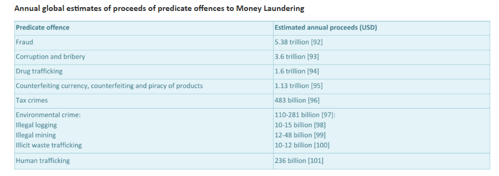
FATF Annual global estimates of proceeds of predicate offences to Money Laundering
29/08/2025
FATF says:-
It is worth noting that the estimates of proceeds of crime give a different ranking to the analysis in the previous section based on what were considered the highest risks in countries' Mutual Evaluation Report [MER]
The following table provides information on major predicate offences (i.e., those frequently identified in Money Laundering Reports, or MERs), ordered by estimated proceeds of crime.
- The estimates in this section have been taken from various reliable sources and are based on different methodologies.
- The estimates in this section are not considered to be definitive, given the difficulties acknowledged in estimating proceeds of crime, the difference in methodologies used and that some of the estimates may already be (or later become) outdated.
- They are presented here for illustrative purposes, to encourage countries to consider the importance of predicate offences on an international level, even if they are not of high importance in the country itself.
- Countries may look for updated estimates from reliable sources when they come to update their NRA or prioritise other risk assessment work, and in many cases also do their own estimations
The “top four” predicate offences are often cited as being fraud, corruption, drug trafficking and tax crimes.
As all these crimes could have cross-border elements, it is recommended that countries consider the risks of proceeds of these crimes entering their jurisdictions for laundering, even if the offence is not prevalent domestically.


The Team
Meet the team of industry experts behind Comsure
Find out moreLatest News
Keep up to date with the very latest news from Comsure
Find out moreGallery
View our latest imagery from our news and work
Find out moreContact
Think we can help you and your business? Chat to us today
Get In TouchNews Disclaimer
As well as owning and publishing Comsure's copyrighted works, Comsure wishes to use the copyright-protected works of others. To do so, Comsure is applying for exemptions in the UK copyright law. There are certain very specific situations where Comsure is permitted to do so without seeking permission from the owner. These exemptions are in the copyright sections of the Copyright, Designs and Patents Act 1988 (as amended)[www.gov.UK/government/publications/copyright-acts-and-related-laws]. Many situations allow for Comsure to apply for exemptions. These include 1] Non-commercial research and private study, 2] Criticism, review and reporting of current events, 3] the copying of works in any medium as long as the use is to illustrate a point. 4] no posting is for commercial purposes [payment]. (for a full list of exemptions, please read here www.gov.uk/guidance/exceptions-to-copyright]. Concerning the exceptions, Comsure will acknowledge the work of the source author by providing a link to the source material. Comsure claims no ownership of non-Comsure content. The non-Comsure articles posted on the Comsure website are deemed important, relevant, and newsworthy to a Comsure audience (e.g. regulated financial services and professional firms [DNFSBs]). Comsure does not wish to take any credit for the publication, and the publication can be read in full in its original form if you click the articles link that always accompanies the news item. Also, Comsure does not seek any payment for highlighting these important articles. If you want any article removed, Comsure will automatically do so on a reasonable request if you email info@comsuregroup.com.


